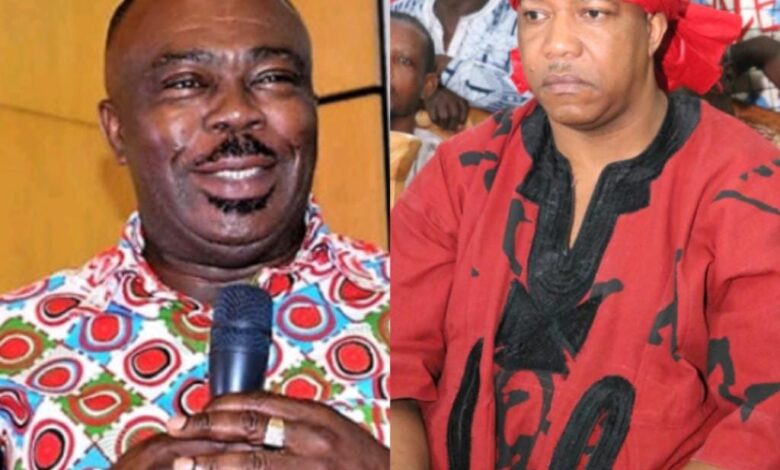La Homowo In Limbo – As Asafo, Youth, Others Express Displeasure Over Injustice

There is brewing tension in La in the La Dadekotopong Municipality of the Greater Accra Region over what the Asafo Company of La Abese Adonten described as injustice and a breach of law by the La Traditional Council.
Despite judgment, ruling, and directives by a competent court of Ghana to include the Chief of La Abese Adonten, HRDH Nii Kwade Okropong I, into the La Traditional Council, the council has failed to adhere to the court directives.
This and other issues may have negative implications on the Traditional Council, which will not augur well for the unity and development of La.
Homowo, which means “hooting at hunger,” is more than a festival; it is a profound reflection on the resilience and unity of a community that has triumphed over adversity.
However, recent developments and decisions by the La Traditional Council not to adhere to the court directives have raised serious concerns that need the attention of the Ministry of Chieftaincy Affairs, the National Security, and other authorities to bring an end to the matter.
This will ensure an incident-free period before, during, and after the Homowo festival and bring peace and harmony to the La community.
Many African societies, including Ghana, have faced the consequences of chieftaincy disputes, which have led to prolonged conflicts, claiming lives and properties in the affected areas.
In some regions of Nigeria, conflicts over chieftaincy titles and traditional roles have resulted in violent clashes, causing significant social unrest and disruption to community life. Similarly, in Ghana, disputes over traditional leadership in some communities have led to legal battles and social divisions, impacting the overall peace and stability of the areas involved.
In a joint press briefing at the forecourt of La Abese Adonten Palace, the Executives and Management Committees of the Clan Houses/Lineages, in collaboration with the Abese Asafo Company and Youth, addressed by the Committee Chairman, Mr. John Mensah Anang, registered their displeasure over the exclusion of the La Abese Adonten Mantse.
They outlined the key issues that have prompted the Executives and Management Committees of the Clan Houses/Lineages, in collaboration with the Abese Asafo Company and Youth, to caution the leadership of the La Traditional Council to resolve these matters to avoid potential unrest during the festival.
He revealed that for the past nine years, Abese Adonten, one of the leading and prominent quarters in La, has been excluded from deliberations and governance in La.
According to him, despite a Court Judgement on February 20, 2024, of Mandamus, the La Traditional Council was given a 30-days Court Order to admit him into the Council. In March 2024, they filed a Stay of Execution pending Appeal, and a ruling was given in favor of Nii Kwade Okropong I, Abese Mantse, on June 3, 2024.
Despite this, Nii Kwade Okropong I, the Abese Adonten Mantse, has not been accepted into the La Traditional Council, which undermines the principle that the Traditional Council should function inclusively to preserve cultural heritage and community harmony.
Abese, he said, is one of the two Paramountcy Stools of La Dadekotopon and has been denied its birthright for almost a decade, adding that the exclusion of Abese Adonten demonstrates a severe breach of traditional and legal norms.
The Committee Chairman stated that in many African societies, the inclusion of all Quarters in decision-making processes ensures that diverse perspectives are considered, leading to more balanced and representative governance.
He added that exclusion, on the other hand, leads to disenfranchisement and disunity, which can erode the cultural and social fabric of the community.
“Furthermore, legal expert Kwame Frimpong asserts, ‘Ignoring court rulings and excluding legitimate members from governance not only violates legal principles but also destabilizes the social fabric’ (Frimpong, 2015),” he quoted Kwame Frimpong.
According to him, this situation is a clear example of how disregarding legal mandates can lead to broader societal issues. In the case of Abese Adonten, the continuous exclusion despite a court ruling not only disrespects the legal system but also breeds resentment and unrest within the community.
He said the legitimacy of the La Traditional Council is called into question when it fails to abide by legal decisions, thereby undermining its authority and the rule of law.
He stated that the exclusion of the Abese Mantse has tangible consequences for the community. With its rich cultural heritage and historical significance, Abese brings invaluable contributions to the deliberations and governance of La.
According to him, its absence means that crucial cultural insights and traditional wisdom are missing from the Council’s decisions. This gap can lead to policies and decisions that are not fully representative or effective in addressing the needs and aspirations of the entire community.
“La has two Paramountcy Quarters: ‘Abese’ and ‘Kowe.’ Each of these Paramountcies has its own Paramount Stool for the installation of a ‘King’ (La Mantsɛ) for La when it is their tenure to do so. There is no gainsaying that the La Stool is currently vacant following the demise of HRM Nii Kpobi Tettey Tsuru III.”
“It is therefore worth noting that both ‘Abese’ and ‘Kowe’ Paramountcies have equal rights to perform statutory annual purification rites for their Paramount Stools: ‘Nii Sei Yɛlɛ Yeli.’ However, for the past three years, the official program for the La Homowo Festival has only recognized ‘Kowe’ as the performer of the ‘Purification Rite for the La Paramount Stool.'”
“It is our hope that through dialogue and mutual respect, we can preserve the integrity of Homowo and maintain the unity that is central to the Ga people’s strength and heritage.


